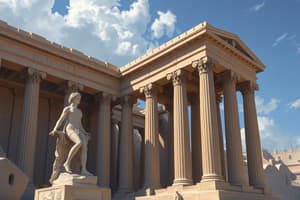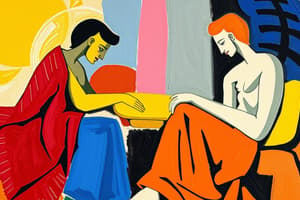Podcast
Questions and Answers
What is The Parthenon?
What is The Parthenon?
- An Enlightenment palace
- A Greek temple (correct)
- A medieval fortress
- A Roman theater
What are the major themes of the Classical Period?
What are the major themes of the Classical Period?
Balance, truth/reason, democracy/republic, polytheism, and humanism.
During the Renaissance, scientists adopted the empirical methodology of early Greek practitioners and theorists.
During the Renaissance, scientists adopted the empirical methodology of early Greek practitioners and theorists.
True (A)
During the Enlightenment, literature from the Middle Ages formed the foundation of education and intellectual standards.
During the Enlightenment, literature from the Middle Ages formed the foundation of education and intellectual standards.
Today's Romance languages derived from the Roman language of Latin.
Today's Romance languages derived from the Roman language of Latin.
What colors represent architecture, art, history, and literature in the timeline of the Classical Period?
What colors represent architecture, art, history, and literature in the timeline of the Classical Period?
What is humanism?
What is humanism?
Classical architecture influences modern-day structures such as the Lincoln Memorial.
Classical architecture influences modern-day structures such as the Lincoln Memorial.
In Greek and Roman religions, Muses were primarily goddesses of inspiration for artistic creations.
In Greek and Roman religions, Muses were primarily goddesses of inspiration for artistic creations.
What is polytheism?
What is polytheism?
What does truth/reason refer to?
What does truth/reason refer to?
Flashcards are hidden until you start studying
Study Notes
Classical Period Overview
- The Parthenon is an iconic example of Classical Greek architecture.
- Major themes of the Classical Period include balance, truth, democracy, polytheism, and humanism.
Learning Outcomes
- Ability to identify key themes and contributions of the Classical Period.
- Analyze works of visual art, performing art, and literature from this era.
- Understand the significance of advancements and cultural exchanges during the period.
Historical Context
- The Renaissance saw a revival of Greek empirical methodologies, notably influenced by Hippocrates.
- Enlightenment thinkers built upon Roman literature and Greek philosophy, shaping modern education and intellectual standards.
Language and Culture
- Romance languages evolved from Latin, the language of the Roman Empire, forming a lasting linguistic legacy.
- Ancient civilizations primarily adhered to polytheistic beliefs, worshipping multiple gods.
Key Themes and Concepts
- Humanism: Focus on human accomplishments and potential across cultures.
- Democracy/Republic: Development of governance systems empowering people.
- Truth/Reason: Pursuit of factual knowledge through logical reasoning led by philosophers like Socrates, Plato, and Aristotle.
Important Art and Architecture
- Statues, such as those of Socrates and Hermes, exemplify the era's artistic focus on balance.
- The Lincoln Memorial showcases influence of Classical architecture, reflecting dignity and permanence.
Philosophical Contributions
- Balance in philosophy and art emphasizes harmony among conflicting elements.
- Muses played a crucial role in inspiring artistic pursuits in Greek and Roman culture, representing creativity across various fields.
Examining Classical Influence
- Classicism today refers to artistic and philosophical principles rooted in Greco-Roman traditions, not ancient Egypt or China.
- The enduring impact of classical architecture is evident in modern constructions, continuing to shape public and civic designs.
Studying That Suits You
Use AI to generate personalized quizzes and flashcards to suit your learning preferences.




